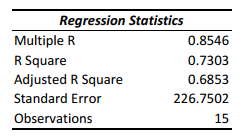SCENARIO 14-10
You worked as an intern at We Always Win Car Insurance Company last summer. You notice that individual car insurance premiums depend very much on the age of the individual and the number of traffic tickets received by the individual. You performed a regression analysis in EXCEL and obtained the following partial information:

-Referring to Scenario 14-10,to test the significance of the multiple regression model,what is the form of the null hypothesis?
Definitions:
Ageist
Having prejudice or discrimination on the grounds of a person's age.
Dementia
A category of brain diseases that cause a long-term and often gradual decrease in the ability to think and remember, affecting a person's daily functioning.
Major Neurocognitive Disorder
A significant decline in cognitive function, including memory, attention, learning, and others, that interferes with everyday independence and activities, previously known as dementia.
Delirium
Delirium is an acute, often reversible state of confusion and disorientation, typically resulting from physical or mental illness, characterized by a rapid onset and fluctuating levels of consciousness.
Q35: Referring to Scenario 12-5,the value of the
Q45: Neural networks use the validating data to
Q50: An interaction term in a multiple regression
Q72: Referring to Scenario 16-14,the best interpretation of
Q97: Referring to Scenario 13-12,the p-value of the
Q109: The method of moving averages is used<br>A)to
Q117: Referring to Scenario 14-8,the estimate of the
Q122: Referring to Scenario 16-6,the fitted trend value
Q145: Referring to Scenario 12-5,there is sufficient evidence
Q171: Referring to Scenario 13-5,the estimates of the